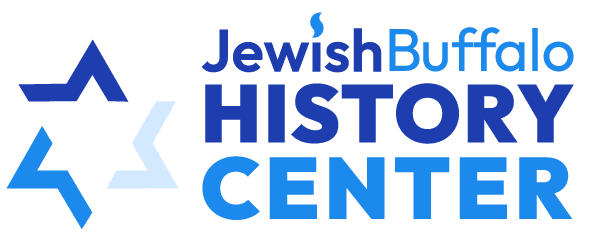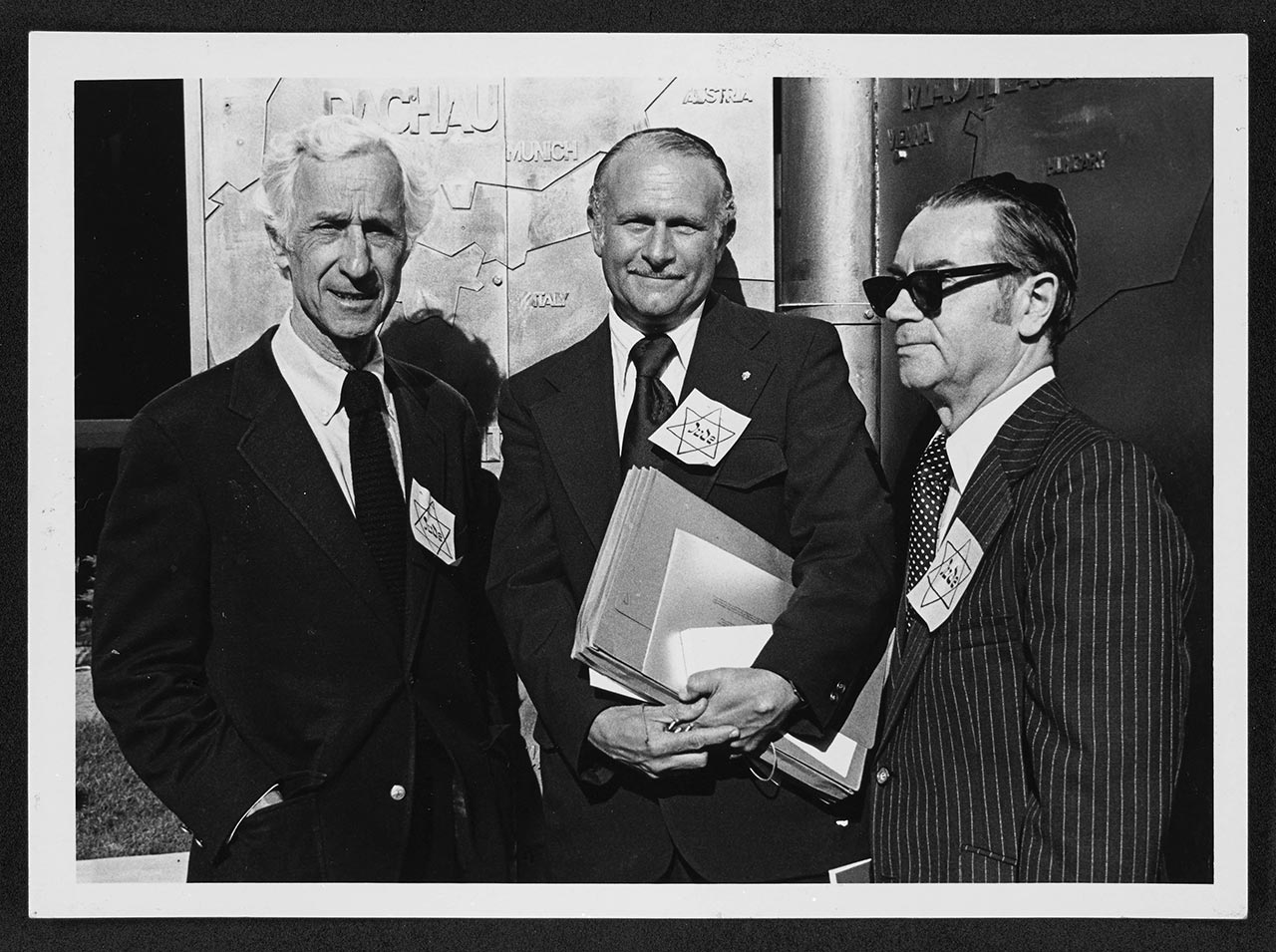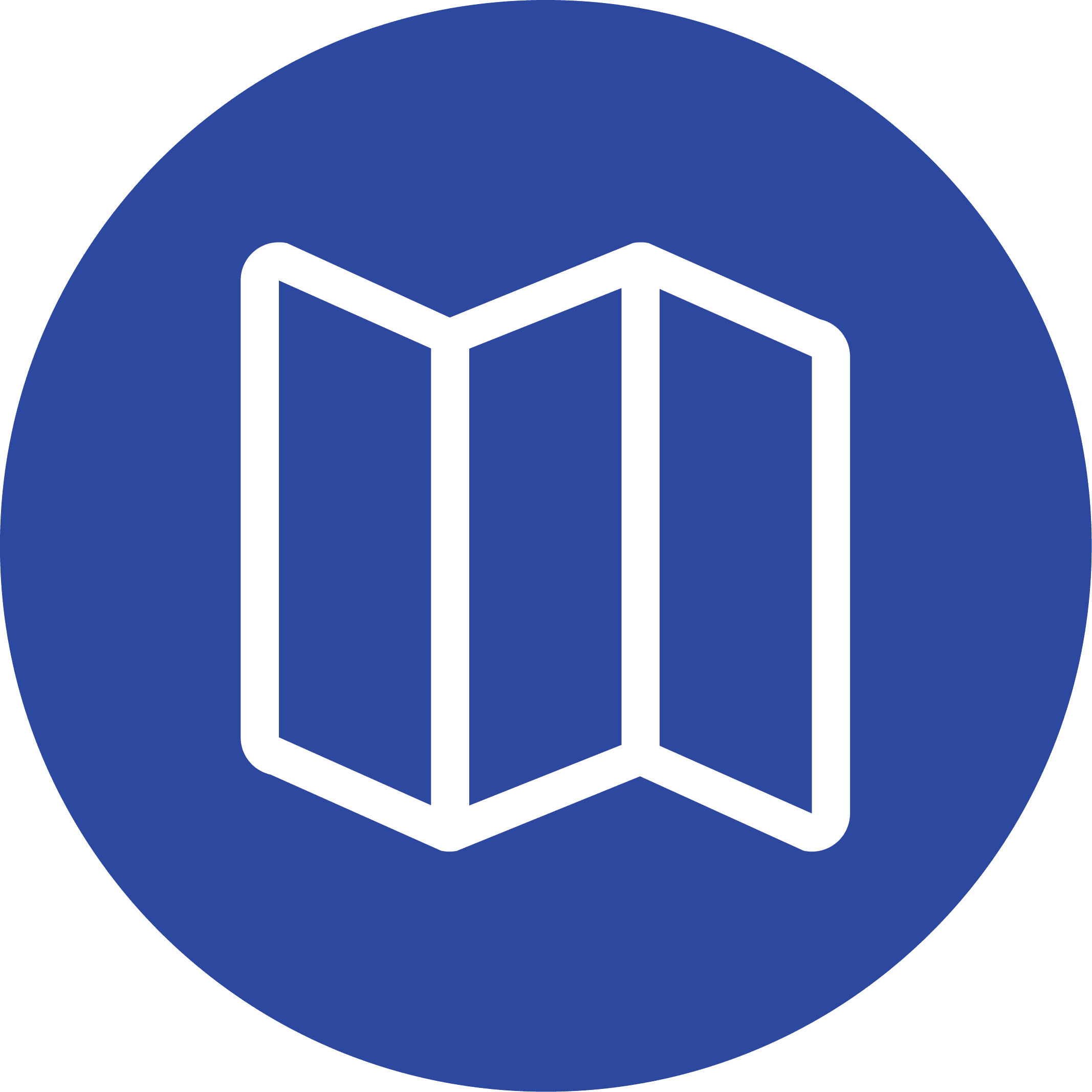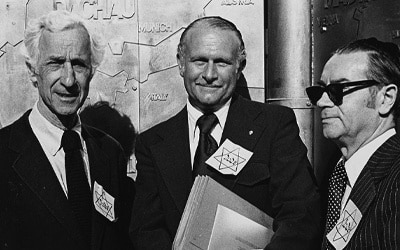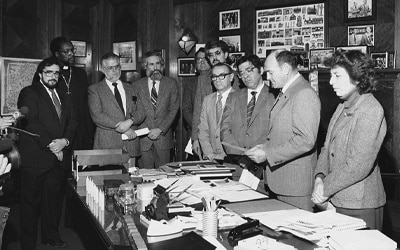Dedication of the Holocaust Memorial at the Jewish Community Center, Getzville, NY, 1977
Dedication of the Holocaust Memorial at the Jewish Community Center, Getzville, NY, 1977. L-R, Tony Rosenthal (artist), Morris Mesch and Rubin Literman. Morris Mesch Collection, Permission of the University Archives, University at Buffalo
Organizations / Holocaust Resource Center
The Holocaust Resource Center of Buffalo, teaches the lessons of the Holocaust, remembers the survivors and victims of the Holocaust and promote social justice, civic responsibility, and human rights through documentation and personal testimony of local Holocaust survivors and a wide range of programming.
Overview
The Holocaust Resource Center of Buffalo (HRC) began work as a center for teachers and researchers in 1983, with a non-sectarian group of founders including survivors, led by educator Toby Ticktin Back. The center began with funding from the Buffalo Jewish Federation, state grants and private foundations. It was officially opened as a center on March 18, 1984 at the Jewish Community Center, Getzville, with a showing of “As If It Were Yesterday.” Directed by Myriam Abramowicz the film retold of the rescue of children from the Nazis during the Belgian Occupation.
The launch of the Holocaust Resource Center was the result of several years of planning that brought together other independent activities under one organization during the 1980s. The Kedoshim Committee, a semi-autonomous grouping allied with the Jewish Federation organized annual Holocaust community wide commemoration. In addition, Holocaust survivor Ruben Literman and community lay leader, Morris Mesch, led a sub-committee to commission the creation of a Holocaust Memorial choosing the artist Bernard (Tony) Rosenthal as its sculptor. Committee members included a number of survivors, including Alex Bialys, David Blitzer, Saul Friedman, Nathan Lewkowitz, William Markowitz, Max Pohl, Nadzia Rosenbers, Julian Silbiger, Abraham Traub and Rubin Literman (Co-Chairman and Treasurer). Morris Mesch was the community committee co-chair, while Arnold B. Gardner was Chairman of Fund Raising Drive. Lester I. Levin and William L. Grossman, served as executives of their respective agencies, the Jewish Federation and the Jewish Community Center, and Sydney Abzug, retired Federation executive also served. Other members included artist and University Professor, Harvey Breverman and John M. Laping, Jewish Community Center architect, Samuel S. Alt, Eugene Bester, Saul Bogan, Isadore Snitzer, Oscar Stromberg and Jacob Weinberger.
The memorial is located in front of the Benderson Jewish Community Center, and was dedicated on April 17, 1977. Consisting of five panels that turn on a center shaft like the pages of a book, the dedication panel bears the dates during which the Holocaust occurred, and the Hebrew and English words “Let us not forget.” Other panels indicate where death camps were located on maps. One panel includes a dedication to the defenders of the Warsaw Ghetto, while another panel includes the text of the Partisans’ Song. Other panels include a tattooed number and a quotation from Anne Frank’s diary. A traditional prayer in memory of the dead, appears on a further panel, while the tenth panel is devoted to the creation of the State of Israel. The sculpture was rededicated on May 4, 1997, and the sculpture was relocated in 2012 into more prominent site in front of the redesigned entrance to the Jewish Community Center.
Separate from the Holocaust Memorial sculpture commission, community commemorative events were held annually at the direction of many survivors. A number of local survivors including Gerda Klein and Dr. Sol Messinger also gave public talks to student groups. Toby Ticktin Back, a teacher at the High School of Jewish Studies, Bureau of Jewish Education used survivors testimony in educational courses from the 1970s from her own research, however, there was no formal process to collect survivor testimonies. In February 1980, Toby Back wrote to Leonard Rochwarger, then the President of the Jewish Federation of Buffalo seeking support for the establishment of a center, that could do this work and more.
The first meeting of the Holocaust Resource Center Study Committee was held on July 16, 1980. The committee drew its membership from educators and survivors. It included historian Mark Goldman, Rabbi Dr. Martin L. Goldberg, Kathy and Richard Gordon, Professor George and Wilma Iggers, Gerda Klein, Ruben Literman, Ethel Melzer, Dr. Sol Messinger, Dr. Alan Podet, Anna Post, Jane Fischman, Reed Taylor, the Rev. Robert Grimm, Rabbi Leonard Buchen, William S. Allen, Clayton Adams, and Marlene Glickman, among others.
In early 1981 secured funding from New York State and local foundations to start a Holocaust Resource Center, supplemented by monies from the Buffalo Jewish Federation. Les Arries, President of Channel 4 and then President of the local chapter of the National Conference of Christians and Jews provided recording time for survivor testimonies at Channel 4 as part of their support of Buffalo Community activities. Over several years, 90 interviews were created, later converted to DVD’s that have since been digitized by the United States Holocaust Memorial Museum in Washington, D.C. A listing of Buffalo interviews can be searched here. The testimonies include Holocaust survivors, liberators, resisters, fighters, and righteous gentiles interviewed by Toby Tickin Back and Rich Newberg. For some of the interviews, a synopsis was created by Dr. George Rudinger and Luba Literman.
An administrative archive that surveys the activity of the Holocaust Resource Center as an educational and commemorative organization is housed at the University at Buffalo.
The Holocaust Resource Center itself also maintains archival materials relating to individual survivors and speakers who have been part of the Center’s active outreach and educational activities. These records remain within the Holocaust Resource Center and some of these materials are available online through individual stories of survivors, additional testimonies, as well as longer films. A special profile by the Buffalo News in April 2017, featured 31 local WNY Holocaust-era Survivors.
Locations Over Time
Documents
Articles
31 local WNY Holocaust-era Survivors
A special profile by the Buffalo News in April 2017, featured 31 local WNY Holocaust-era Survivors.
Gallery
Dedication of the Holocaust Memorial at the Jewish Community Center, Getzville, NY, 1977. L-R, Tony Rosenthal (artist), Morris Mesch and Rubin Literman. Morris Mesch Collection, Permission of the University Archives, University at Buffalo
Dedication of the Holocaust Memorial at the Jewish Community Center, Getzville, NY, 1977
Yom HaShoah commemoration, 1983. Includes Rabbi Shay Mintz, Michael Hyman, RubIn Literman, Mayor Jimmy Griffin and Toby Back. Jewish Community Center Collection, Permission of the University Archives, University at Buffalo.
Yom HaShoah commemoration
Current Work
The Holocaust Resource Center was founded as an independent, non-sectarian and community supported organization that continues its mission more recently within the Buffalo Jewish Federation. It’s work includes heightening public awareness and knowledge of the Holocaust era (1933-1945) and to the establishment of a living memorial to six million Jews and five million other victims of Nazi persecution. It promotes an understanding of the Holocaust within the general community by documenting survivor testimony and by educational outreach to adults, youth and children. It maintains contact with the media on Holocaust related topics and acts as a liaison with local and national agencies for Holocaust related programming. The Holocaust Resource Center provides public presentations, programming and commemorative events. Through the personal testimony of local Holocaust survivors and second-generation descendants arranged through the Speakers’ Bureau, in-school visits, and public programming, it provides a link to eyewitness testimony. Survivors have visited schools and other venues throughout the seven counties of Western New York from Lockport to Fredonia, and from Pioneer to Clarence, NY.
The daily work of the Holocaust Resource Center of Buffalo is managed by an administrator with the aid of a board composed of survivors, second and third generation descendants, educators and community members. Toby Ticktin Back served as a volunteer founder director in the first years, later becoming Director Emeritus. From 1983 to 1985, the role of administrator was held by Marilyn Reich [Toth]. Other administrators have included Susan Brown (1985-1989), Maureen Klein (1989-1991), Lois Miller Weinstein (1992-1998), Sylvia Schwartz (1999-2012), Sandy Saada (2012-2015) and Mara Koven-Gelman (2015-2019). Since April 2019, the Holocaust Resource Center has been directed by Elizabeth Schram. Education staff in specific roles have included Andrew Beiter, Educational Consultant, Jim Gang, NGI Holocaust Survivor Videotaping Coordinator, Dr. Timothy Redmond, NGI Teacher Conference Coordinator, Lori Raybold, NGI Washington Teacher Trip Coordinator, and Elizabeth Marmion, Arts And Writing Co-Chair.
The Holocaust Resource Center commemorative calendar includes an annual Kever Avot v’Imaot (visiting the graves of loved ones), Kristallnacht Commemoration (“Night of Broken Glass”) every November, and observance of the U.N. International Holocaust Remembrance Day event each January 27. It also holds an annual Yom HaShoah (Holocaust Remembrance Day), community-wide commemoration, as well as a Holocaust Commemorative Proclamation Event at the Erie Country Executive and Mayor of Buffalo’s offices every alternating Spring. Most recently it adopted the International Holocaust Remembrance Alliance definition on antisemitism.
The Holocaust Resource Center also provides in-service workshops for educators (teachers and librarians) from public and private schools, and supports trips to the United States Holocaust Memorial Museum in Washington, D.C.. Since 1990, the Holocaust Resource Center along with the Mary Deane Freeland and Renee and Boris Joffe has sponsored an annual Arts and Writing Contest for Western New York Middle School and High School students to reflect on a Holocaust-related topic through the medium of visual media or the written word.
The Holocaust Resource Center (HRC) has provided services to survivors that have included Café Europa supported through the Claims Conference and in cooperation with the Jewish Community Center. The HRC also connects survivors with services through Jewish Family Services of Buffalo and Erie County. It provides support to local Holocaust survivors in the form of holiday baskets and other support activities for survivors. The Holocaust Resource Center of Buffalo supports building a community of members in support of the mission of the Holocaust Resource Center of Buffalo which is to “Teach The Lessons Of The Holocaust, Remember The Survivors And Victims And Promote Social Justice, Civic Responsibility And Human Rights.” The HRC also partners with several organizations to connect the lessons of the Holocaust to contemporary genocides including the Anne Frank Project at Buffalo State College.
Discover More Collections
Resources in the University Archives, University at Buffalo
Thank You
Our thanks to the Holocaust Resource Center for its participation in the Jewish Buffalo Archives Project that led to the creation if the Holocaust Resource Center Collection. Our thanks to Helene Mesch and Gloria Tetewsky for their participation in the Jewish Buffalo Archives Project that led to the creation of papers that include Holocaust related materials. Our thanks also to Harold Siegel (z”l) and Rabbi Shay Mintz (z”l) for the donation of their materials that included Holocaust related materials. We are grateful to the University at Buffalo, University Archives for permission to use images within the collections of the Jewish Buffalo Archives, created as part of a project to document Jewish Buffalo that was funded by the Foundation for Jewish Philanthropies under the auspices of the Bureau of Jewish Education.
Please contact the Holocaust Resource Center directly or visit the HRC on the web for further information about its programming,
